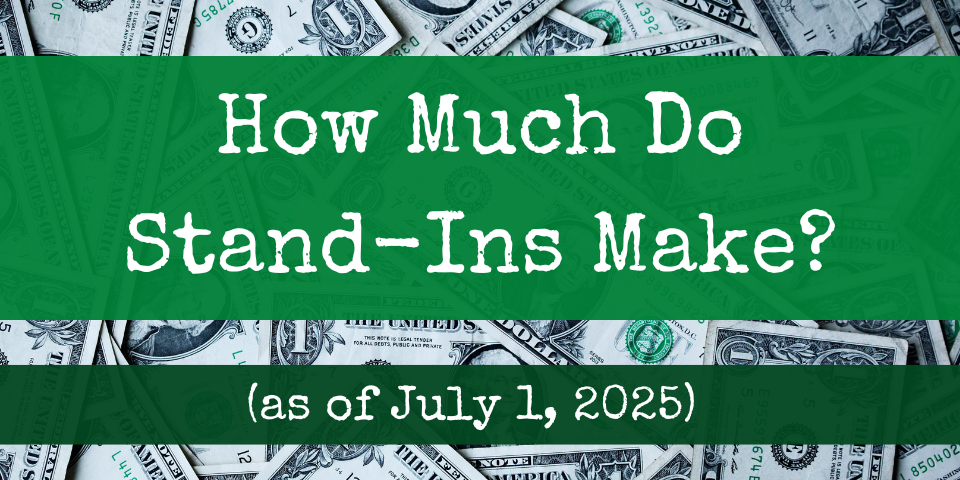If you’re a stand-in in SAG-AFTRA, you may have heard of something called “financial core” or “fi-core.”
There is a lot of confusing, loaded, even wrong information out there about financial core status. The website Fi-Core Central exists to clear up a lot of the professional questions around financial core, and The Fi-Core Workbook — a downloadable ebook by Ben Hauck available on the website — clarifies financial core and many of its implications, offering unbiased guidance and instruction for screen actors weighing financial core status.
But if you’re not a screen actor and simply a stand-in in SAG-AFTRA, you may be wondering what financial core status is and whether it would be worthwhile to become fi-core.
This article covers the topic of financial core and how it relates to SAG-AFTRA stand-ins.
“Financial Core” Defined
The term “financial core” originated in the 1963 United States Supreme Court case National Labor Relations Board v. General Motors. In dispute was whether workers had to follow union rules in working in a union shop.
The ruling decided that what constituted the most basic requirement for union membership was the payment of fees and dues. That is, to be considered a union member, you needed at the very least to pay, say, an initiation fee and periodic dues. The passage in the ruling where the term originated reads:
[The term] “Membership” as a condition of employment is whittled down to its financial core.
This is to say that according to the ruling you did not also have to follow union rules in order to be considered a member. At the very least, you needed to pay fees and dues. By paying the appropriate fees and dues, you could work in a union shop, and you were not obligated to follow union rules.
The term “financial core” was further refined in the 1988 United States Supreme Court case Communication Workers of America v. Beck, wherein just how much a financial core worker had to pay a union was clarified. That ruling laid out that financial core workers needed only to pay for union activities “germane to collective bargaining, contract administration, and grievance adjustment.”
In other words, any additional activities beyond collective bargaining and enforcement of its contracts — for example, any political or ideological activities by the union — the financial core worker did not have to pay for in fees. Therefore, a financial core union member in theory paid less than a standard union member insofar as the union did more than collective bargaining and its related activities.
All in all, the term “financial core” has come to refer to a worker in nearly any union who works in jobs in a union’s jurisdiction, pays the appropriate fees and dues to the union, but does not have to follow union rules.
Financial Core & SAG-AFTRA
SAG-AFTRA has a rule called Global Rule 1, which prohibits members from working on a non-union job in its jurisdiction anywhere in the world.
Since financial core workers do not need to follow union rules, SAG-AFTRA members who declare financial core status do not have to adhere to Global Rule 1 and thus can work in non-union jobs without fear of union prosecution.
For the SAG-AFTRA member, “financial core” tends to mean that the worker has the ability to work in both union and non-union jobs within SAG-AFTRA jurisdiction. However, “financial core” means that the worker merely pays fees and dues and does not have to abide by union rules. The ability to work non-union is a consequence of going fi-core in SAG-AFTRA.
Financial Core & Stand-Ins
If you work regularly and exclusively as a SAG-AFTRA stand-in, you will probably not open up many stand-in opportunities by declaring financial core.
This is because most stand-in jobs — at least those in major markets like Los Angeles, Las Vegas, Sacramento, San Diego, San Francisco, the Hawaii Zones, and the New York Zone — are union jobs. Of those stand-in jobs that are not union (such as on non-union film and non-union commercials), most of these stand-in jobs pay less than union stand-in rates.
Of those stand-in jobs outside major markets, these stand-in jobs may fall outside of union jurisdiction. The 2005 SAG Basic Agreement only has jurisdiction over background actors in the markets of Los Angeles, Las Vegas, Sacramento, San Diego, San Francisco, the Hawaii Zones, and the New York Zones. This means that the SAG-AFTRA stand-in who stands in on projects outside these markets is working outside union jurisdiction, and therefore does not violate Global Rule 1 when standing in on these projects.
Therefore, declaring financial core status in order to work as a stand-in outside major markets does not help you legally get more stand-in work because this stand-in work is permitted, since it is outside union jurisdiction. In other words, you are able to take stand-in work outside the above major markets even if you are a SAG-AFTRA member since the union does not have jurisdiction over background actors or stand-ins in these markets. It is strongly advisable to contact your regional SAG-AFTRA local office to confirm this information before accepting stand-in work, if you fear taking it may violate Global Rule 1.
Usually, stand-ins in these markets make less than stand-ins in the markets covered by the 2005 SAG Basic Agreement. The principal actors on these productions may be paid union rates because the Basic Agreement has jurisdiction over them, but their stand-ins, since they are working outside the union’s jurisdiction, usually are making less than stand-ins in the markets outlined in the Basic Agreement.
Other stand-in jobs — like those on print shoots — are also outside union jurisdiction, so you would be free to stand in on them as long as there is no video or behind-the-scenes footage being shot involving you.
But, if you are not exclusively a SAG-AFTRA stand-in, and if you are also, say, a SAG-AFTRA actor or other type of worker represented by SAG-AFTRA, you may open yourself up to other work opportunities in the non-union world by going fi-core. That is, if you work as a stand-in and also as a principal actor, declaring financial core status may allow you to work at union rates as a stand-in while also working union and non-union as an actor.
Financial Core as a Personal Decision
Many opinions swirl around for and against SAG-AFTRA membership and SAG-AFTRA rules. Many opinions also swirl around for and against financial core status and working non-union.
However, for what all can be said for and against going fi-core, declaring financial core status is ultimately a personal decision. No two financial core workers are alike, so no blanket characterizations can be made about their motives, interests, etc., in declaring financial core status. Many unique factors may figure in to a union member’s decision to go fi-core, which could include financial reasons, economic reasons, professional reasons, political reasons, etc.
Financial core status affords some SAG-AFTRA members the ability to make an income as, say, an actor, where they may have been historically unable to book union acting jobs. Some may be faced with an inability to pay bills because of union rules against working non-union, so going fi-core enables them to pay their bills with non-union work. Some may disagree with the political activities of the union, so going fi-core ensures they are not supporting speech with which they disagree. Some may envision their professional success independent of union jurisdiction, so going fi-core allows them professional freedom.
All in all, each financial core worker has different reasons for declaring financial core status, and if a stand-in were to declare financial core status, only that stand-in could explain his/her reasons for doing so and what he/she intended by the decision.
Things to Consider When Weighing Financial Core
When you declare financial core status within SAG-AFTRA, you will lose some member-only privileges, like voting rights. However, you will also keep some benefits that come with union membership — notably, you will still be eligible to earn toward union health insurance and pension plan when you work on union jobs. You will also gain some benefits when you go fi-core — notably, you will have the ability to work on non-union jobs.
The Fi-Core Workbook goes into great detail about what you keep, lose, and gain when you declare financial core status. The ebook offers up questions to consider if you are a screen actor deciding whether financial core is right for you. Should you want to declare financial core status, the ebook gives instruction on the steps you need to take, as well as shows you what you should do after you declare financial core status.
So if you are a stand-in who is also a screen actor, and if you are weighing whether to declare financial core status, you may want to look into getting The Fi-Core Workbook.
Standing in When You Are Fi-Core
If you are a SAG-AFTRA stand-in who does declare financial core status, you may see little to no difference in your work experience.
As financial core, you keep your union number should you need it to write on your voucher. As financial core, you lose your member card, but if you need to trade it for a prop, you can trade some other form of identification or collateral. You will still be paid the same as when you were a card-carrying union member, have access to union reps on set if you have grievances, and earn toward health insurance and pension. In fact, in terms of the contracts you work under, you are still considered a member. It’s just that in going fi-core, you give up your constitutional membership.
More Information
For more information, visit Fi-Core Central and download its ebook, The Fi-Core Workbook.
Have you declared financial core status? What have you gained as a stand-in in going fi-core? Share your experiences below!






Leave A Comment